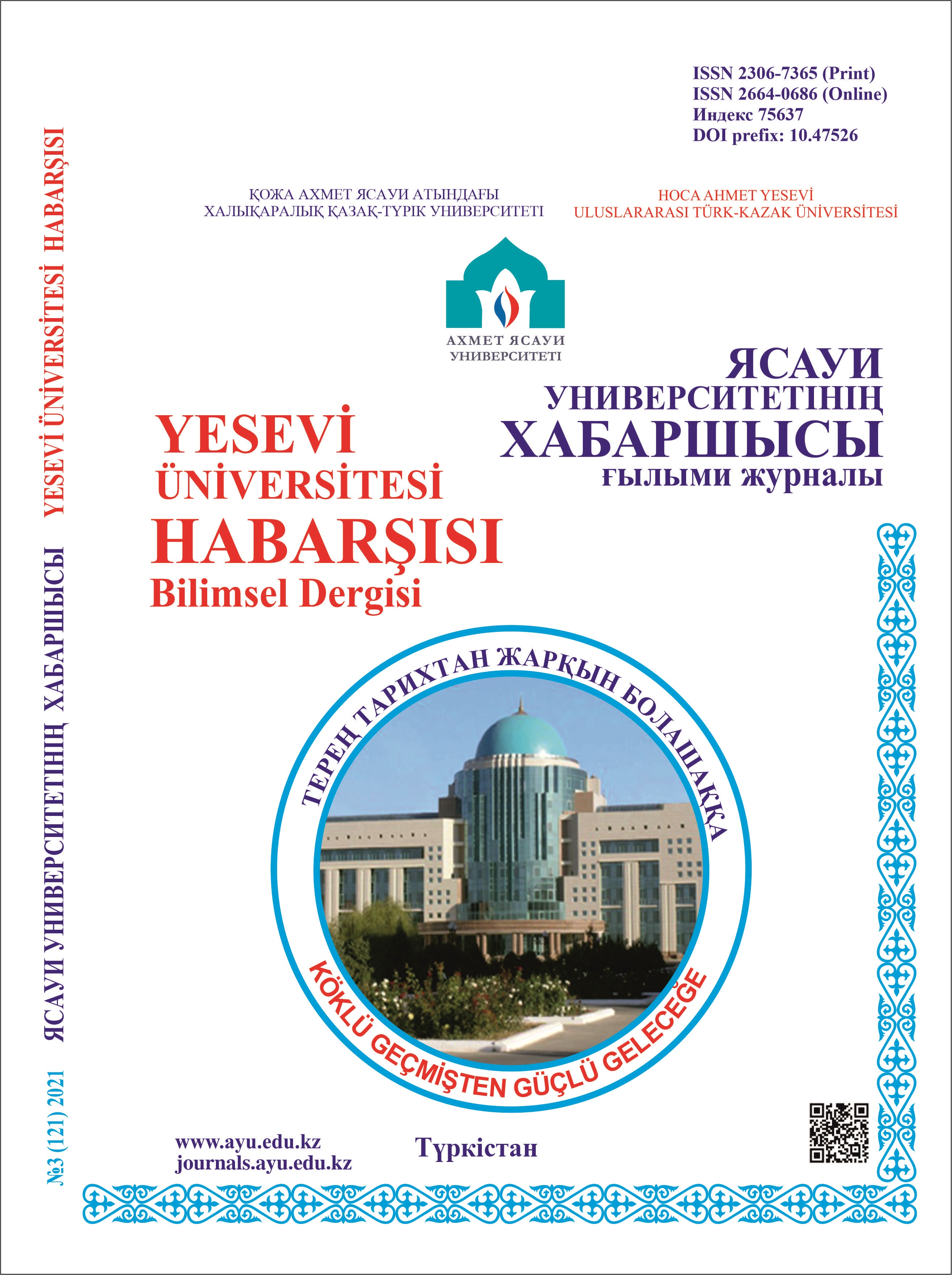Болашақ мұғалімдердің математиканы оқытуға қатысты алаңдаушылығын зерттеу
205 185
Кілт сөздер:
бастауыш білім беру, математикаға байланысты мазасыздық, болашақ мұғалімдер, мұғалімдерді даярлау, педагогикалық білім.Аңдатпа
Математикаға байланысты мазасыздық математикалық есептерді шешу және сандарды күнделікті, академиялық өмірде қолдану кезінде мазасыздық пен уайым сезімі ретінде анықталады. Математика өмірдің барлық аспектілерінде маңызды болғанымен, көптеген адамдар математиканы қиын деп санап, одан қашады. Зерттеулер көрсеткендей, мұндай мазасыздық мұғалімдер арқылы берілуі мүмкін. Сондықтан болашақ мұғалімдердің математикаға байланысты мазасыздық деңгейін кәсіби қызметін бастамас бұрын төмендету және оларды өз саласында табысты, сенімді болатындай етіп даярлау өте маңызды деп саналады.
Осы контексте бұл зерттеудің мақсаты – болашақ бастауыш сынып мұғалімдерінің математикадан сабақ беру мазасыздық деңгейін анықтау болды. Осы мақсат аясында келесі сұрақтарға жауап ізделді:
1. Болашақ бастауыш сынып мұғалімдерінің математикадан сабақ беру мазасыздық деңгейі олардың оқу курсына байланысты өзгере ме?
2. Олардың математика бойынша орташа бағасына байланысты өзгере ме?
Зерттеу Қожа Ахмет Ясауи атындағы Халықаралық қазақ-түрік университетінің бастауыш сынып мұғалімдігі бөлімінде оқитын 60 студент арасында жүргізілді. Бұл сипаттамалық зерттеу сауалнама моделіне негізделген. Болашақ бастауыш сынып мұғалімдерінің математикадан сабақ беру мазасыздық деңгейін анықтау үшін «Математикадан сабақ беру мазасыздығы шкаласы» қолданылды.
Зерттеу нәтижелері болашақ мұғалімдердің математикадан сабақ беру мазасыздығы деңгейінің төмен екенін, олардың математика және математикадан сабақ беру пәндері бойынша жетістіктеріне байланысты өзгермейтінін, бірақ оқу курсына байланысты айырмашылықтар бар екенін көрсетті.
Әдебиеттер тізімі
REFERENCES
Başarır D. Ortaokul Son Sınıf Öğrencilerinde Sınav Kaygısı, Durumluk Kaygı, Akademik Başarı ve Sınav Başarısı Arasındaki İlişkiler: Yayınlanmamış Yüksek Lisans Tezi [The Relationships Between Exam Anxiety, Situational Anxiety, Academic Achievement and Exam Success in Secondary School Senior Dec Students: Unpublished Master's Thesis]. – Ankara: Hacettepe Üniversitesi, 1990. – 64 s. [in Turkish]
Morgan C.T. Introduction to psychology. – Ankara: Meteksan Publications, 1984. – 449 p.
Fennema E., Sherman J. Sex related differences in mathematics achievement and related factors: A further study // Journal for Research in Mathematics Education. – 1978. – №9. – P. 189–203.
Brush L.R. Some thoughts for teachers on mathematics anxiety // Arithmetic Teacher. – 1981. – №29 (4). – P. 37–39.
Quilter D., Harper E. Why we didn't like mathematics and why we can't do it // Educational Research. – 1988. – №30. – P. 121–134.
Hembree R. The nature effects an relief of mathematics anxiety // Journal for Research in Mathematics Education. – 1990. – №26(1). – P. 33–46.
Dreger R.M., Aiken L.R. The identification of number anxiety in college population // Journal of Educational Psychology. – 1957. – №48. – P. 344–351.
Richardson F.C., Suinn R.M. The mathematics anxiety rating scale: Psychometric data // Journal of Counseling Psychology. – 1972. – №19(6). – P. 551–554.
Şahin F.Y. Mathematics anxiety // Educational Research. – 2000. – №(1) 2. – P. 75–79.
Fennema E., Sherman J.A. Fennema-Sherman mathematics attitudes scales: Instruments designed to measure attitudes toward the learning of mathematics by females and males // Journal for Research in Mathematics Education. – 1976. – №7(5). – P. 324–326.
Lee O., Brophy J. Motivational patterns observed in sixth-grade science classrooms // Journal of Research in Science Teaching: The Official Journal of the National Association for Research in Science Teaching. – 1996. – №33(3). – P. 303–318.
McLeod D.B. Research on affect in mathematics education: A reconceptualization. In: D.A. Grouws (Ed.) Handbook of research on mathematics teaching and learning. – New York: Macmillan, 1992. – P. 575– 596.
Dede Y. Matematik eğitimine özgü değer kategorileri ve uygulamaları. In: Bingölbali E., Arslan S., Zembat İ.Ö. (Eds.) Matematik Eğitiminde Teoriler. – Ankara: Pegem A., 2016. – P. 785–802. [in Turkish]
Baloğlu M. Overcoming the fear of mathematics // Journal of Educational Sciences in Theory and Practice. – 2001. – №1(1). – P. 59–76.
Gardner L., Leak G. Characteristics and correlates of teaching anxiety among college psychology teachers // Teaching of Psychology. – 1994. – №21(1). – P. 28–32.
Peker M. Development of Anxiety Scale for Mathematics Teaching // Journal of Educational Sciences and Practice. – 2006. – №5(9). – P. 73–92.
Levine G. Prior Mathematics History, Anticipated Mathematics Teaching Style, And Anxiety for Teaching Mathematics Among Preservice Elementary School Teachers. Paper presented at the Annual Meeting of the International Group for Psychology of Mathematics Education, North American Chapter, Erıc Document Reproduction Service No. ED373972. – 1993. – 22 p.
Karasar N. Bilimsel Araştırma Yöntemleri. – Ankara: Nobel Yayınları, 2001. – 273 p. [in Turkish]
Balcı A. Sosyal Bilimlerde Araştırma Yöntem, Teknik ve İlkeleri. – Ankara: Pegem Akademi, 2022. – 259 s. [in Turkish]
Tekin H. Eğitimde ölçme ve değerlendirme (9. baskı). – Ankara: Yargı Yayınları, 1996. – 344 s. [in Turkish]
Ashcraft M.H., Moore A.M. Mathematics anxiety and the affective drop in performance // Journal of Psychoeducational Assessment. – 2009. – №27(3). – P. 197–205.
Beilock S.L., Gunderson E.A., Ramirez G., Levine S.C. Female teachers’ math anxiety affects girls’ math achievement // Proceedings of the National Academy of Sciences. – 2010. – №107(5). – P. 1860–1863.
Hofstede G. Culture’s Consequences: Comparing Values, Behaviors, Institutions, and Organizations Across Nations. – SAGE Publications, 2001. – 40 p.
Vukovic R.K., Kieffer M.J., Bailey S.P., Harari R.R. Mathematics anxiety in young children: Concurrent and longitudinal associations with mathematical performance // Contemporary Educational Psychology. – 2013. – №38(1). – P. 1–10.
Brady P., Bowd A. Mathematics anxiety, prior experience and confidence to teach mathematics among pre-service education students // Teachers and Teaching: Theory and Practice. – 2005. – №11(1). – P. 37–46.
Ma X. A meta-analysis of the relationship between anxiety toward mathematics and achievement in mathematics // Journal for Research in Mathematics Education. – 1999. – №30(5). – P. 520–540.
Zakaria E., Nordin N.M. The effects of mathematics anxiety on matriculation students as related to motivation and achievement // Eurasia Journal of Mathematics, Science and Technology Education. – 2008. – №4(1). – P. 27–30.

